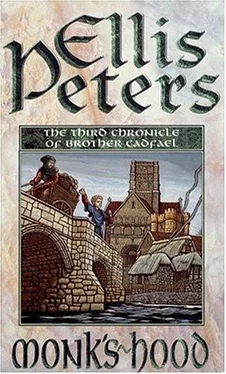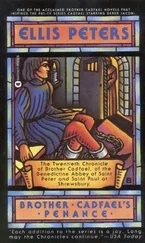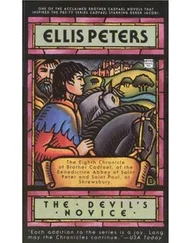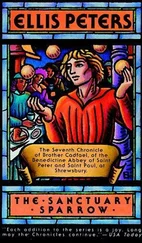In this disputed borderland of soil and law, Cadfael found his heart and mind utterly Welsh, but could not deny that the Englishman had just as passionately held by his own law, and been sure that he was justified. He had not been an evil man, only a child of his time and place, and his death had been murder.
Properly speaking, Cadfael had no business at this house but to observe, as now he had observed. But he went in, nevertheless, up the outdoor stair and into the passage screened off from the hail. A boy emerging from the kitchen louted to him and passed, accepting him as one of the breed, who would know his way here. The hall was lofty and strongly beamed. Cadfael passed through it to the solar. This must be where Bonel had intended to install the panelling commissioned from Martin Bellecote, the transaction which had first caused him to set eyes and heart on Richildis Gurney, who had once been Richildis Vaughan, daughter of an honest, unpretentious tradesman.
Martin had done good work, and fitted it into place here with skill and love. The solar was narrower than the hall, there being a garderobe off it, and a tiny chapel. It glowed and was scented with the polished and sparely carved oak panelling, the suave silvery grain glinting in the light from the wide window. Edwin had a good brother and a good master. He need not repine if he missed the illusory heritage.
“Your pardon, brother!” said a respectful voice at Cadfael’s back. “No one told me there was a messenger here from Shrewsbury.”
Cadfael turned, startled, to take a look at the abbey’s steward here; a layman, a lawman, young enough to be deferential to his employers, mature enough to be in command of his own province.
“It’s I who should ask your pardon,” said Cadfael, “for walking in upon you without ceremony. Truth to tell, I have no errand here, but being in the neighbourhood I was curious to see our new manor.”
“If it is indeed ours,” said the steward ruefully, and looked about him with a shrewd eye, assessing what the abbey might well be losing. “It seems to be in doubt at the moment, though that makes no difference to my commission here, to maintain it in good order, however the lot falls in the end. The place has been run well and profitably. But if you are not sent to join us here, brother, where is your domicile? As long as we hold the manor, we can well offer you lodging, if it please you to stay.”
“That I can’t,” said Cadfael. “I was sent from Shrewsbury to take care of an ailing brother, a shepherd at the folds by Rhydycroesau, and until he’s restored I must take on his duties there.”
“Your patient is mending, I trust?”
“So well that I thought I might use a few hours to come and see what manner of property may be slipping through our fingers here. But have you any immediate reason for feeling that our tenure may be threatened? More than the obvious difficulty of the charter not being sealed in time?”
The steward frowned, chewing a dubious lip. “The situation is strange enough, for if both the secular heir and the abbey lose their claim, the future of Mallilie is a very open question. The earl of Chester is the overlord, and may bestow it as he pleases, and in troublous times like these I doubt if he’ll want to leave it in monastic hands. We could appeal to him, true, but not until Shrewsbury has an abbot again, with full powers. All we can do in the meantime is manage this land until there’s a legal decision. Will you take your dinner here with me, brother? Or at least a cup of wine?”
Cadfael declined the offer of a midday meal; it was yet early, and he had a use for the remaining hours of daylight. But he accepted the wine with pleasure. They sat down together in the panelled solar, and the dark Welsh kitchen-boy brought them a flagon and two horns.
“You’ve had no trouble with the Welsh to west of you?” asked Cadfael.
“None. They’ve been used to the Bonels as neighbours for fifty years now, and no bad blood on either side. Though I’ve had little contact except with our own Welsh tenants. You know yourself, brother, both sides of the border here there are both Welsh and English living cheek by jowl, and most of those one side have kin on the other.”
“One of our oldest brothers,” said Cadfael, “came from this very region, from a village between here and Llansilin. He was talking of his old kinship when he knew I was coming to Rhydycroesau. I’d be glad to carry his greetings, if I can find his people. Two cousins he mentioned, Cynfrith and Owain ap Rhys. You haven’t encountered either? And a brother by marriage, one Ifor ap Morgan … though it must be many years since he had any contact with any of them, and for ought I know this Ifor ap Morgan may be dead long ago. He must be round about Rhys’s own age, and few of us last so long.”
The steward shook his head doubtfully. “Cynfrith ap Rhys I’ve heard spoken of, he has a holding half a mile or so west of here. Ifor ap Morgan … no, I know nothing of him. But I tell you what, if he’s living the boy will know, he’s from Llansilin himself. Question him when you leave, and do it in Welsh, for all he knows English well enough. You’ll get more out of him in Welsh … and all the more readily,” he added with a wry grin, “if I’m not with you. They’re none of them ill-disposed, but they keep their own counsel, and it’s wonderful how they fail to understand English when it suits them to shut the alien out.”
“I’ll try it,” said Cadfael, “and my thanks for the good advice.”
“Then you’ll forgive me if I don’t accompany you to the gate and give you God-speed. You’ll do better alone.”
Cadfael took the hint and his leave, there in the solar, and went out through the hail and by the screened way into the kitchen. They boy was there, backing red-faced from the oven with a tray of new loaves. He looked round warily as he set down his burden on the clay top to cool gradually. It was neither fear nor distrust, but the wariness of a wild creature alert and responsive to every living thing, curious and ready to be friendly, sceptical and ready to vanish.
“God save you, son!” said Cadfael in Welsh. “If your bread’s all out now, do a Christian deed, come out to the gate with me, and show a stranger the way to the holding of Cynfrith ap Rhys or his brother Owain.”
The boy gazed, eyes brightening into interest at being addressed placidly in his own tongue. “You are from Shrewsbury abbey, sir? A monk?”
“I am.”
“But Welsh?”
“As Welsh as you, lad, but not from these parts. The vale of Conwy is my native place, near by Trefriw.”
“What’s your will with Cynfrith ap Rhys?” asked the boy directly.
Now I know I’m in Wales, thought Cadfael. An English servant, if he ventured to challenge your proceedings at all, would do it roundabout and obsequiously, for fear of getting his ears clipped, but your Welsh lad speaks his mind to princes.
“In our abbey,” he said obligingly, “there’s an old brother who used to be known in these parts as Rhys ap Griffith, and he’s cousin to these other sons of Rhys. When I left Shrewsbury I said I’d take his greetings to his kin, and so I will if I can find them. And while we’re about it there’s one more name he gave me, and you may at least be able to tell me if the man’s alive or dead, for he must be old. Rhys had a sister Marared, who married one Ifor ap Morgan, and they had a daughter Angharad, though I’m told she’s dead years ago. But if Ifor is still living I’ll speak the good word to him, also.”
Under this rain of Welsh names the boy thawed into smiles. “Sir, Ifor ap Morgan is still alive. He lives a fair way beyond, nearly to Llansilin. I’ll come out with you and show you the way.”
Читать дальше












